Theories, Principles, and Models in Education and Training
VerifiedAdded on 2023/01/06
|10
|2902
|90
AI Summary
This document discusses the theories, principles, and models of reflective practice in education and training. It also explores the concept of wider professional skills and how they can improve learner motivation, confidence, and achievement. Additionally, it explains the role of quality assurance and quality improvement in organizations.
Contribute Materials
Your contribution can guide someone’s learning journey. Share your
documents today.
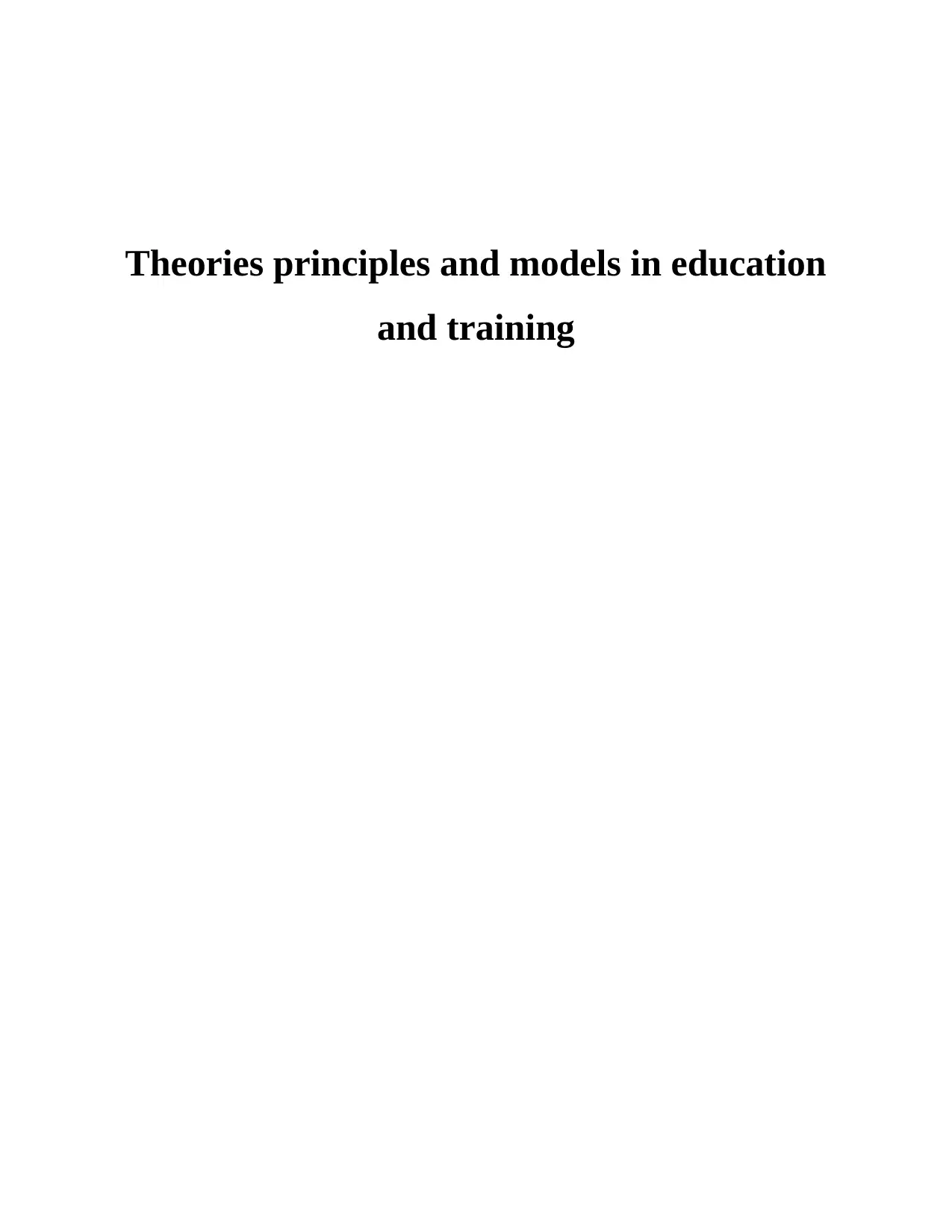
Theories principles and models in education
and training
and training
Secure Best Marks with AI Grader
Need help grading? Try our AI Grader for instant feedback on your assignments.
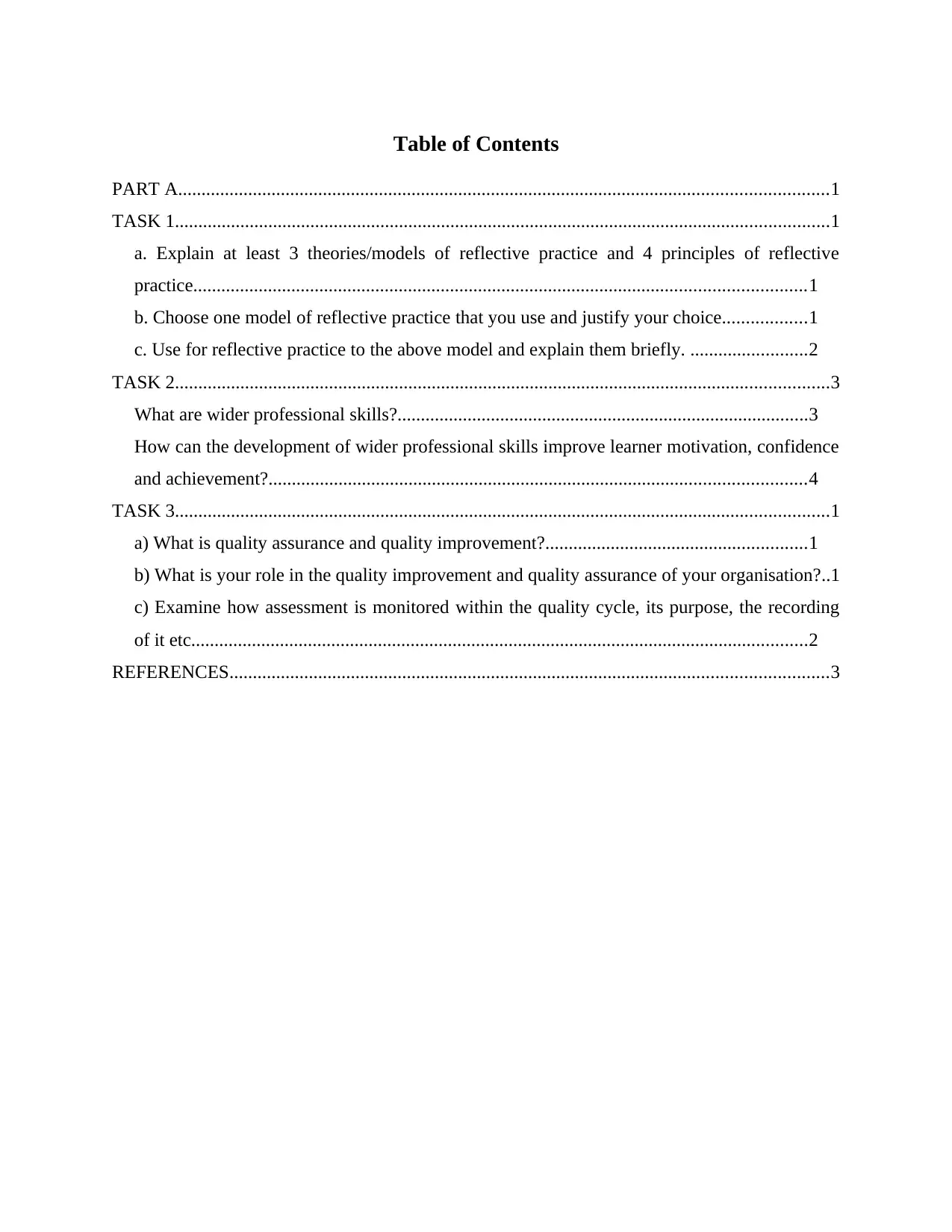
Table of Contents
PART A...........................................................................................................................................1
TASK 1............................................................................................................................................1
a. Explain at least 3 theories/models of reflective practice and 4 principles of reflective
practice...................................................................................................................................1
b. Choose one model of reflective practice that you use and justify your choice..................1
c. Use for reflective practice to the above model and explain them briefly. .........................2
TASK 2............................................................................................................................................3
What are wider professional skills?........................................................................................3
How can the development of wider professional skills improve learner motivation, confidence
and achievement?...................................................................................................................4
TASK 3............................................................................................................................................1
a) What is quality assurance and quality improvement?........................................................1
b) What is your role in the quality improvement and quality assurance of your organisation?..1
c) Examine how assessment is monitored within the quality cycle, its purpose, the recording
of it etc....................................................................................................................................2
REFERENCES................................................................................................................................3
PART A...........................................................................................................................................1
TASK 1............................................................................................................................................1
a. Explain at least 3 theories/models of reflective practice and 4 principles of reflective
practice...................................................................................................................................1
b. Choose one model of reflective practice that you use and justify your choice..................1
c. Use for reflective practice to the above model and explain them briefly. .........................2
TASK 2............................................................................................................................................3
What are wider professional skills?........................................................................................3
How can the development of wider professional skills improve learner motivation, confidence
and achievement?...................................................................................................................4
TASK 3............................................................................................................................................1
a) What is quality assurance and quality improvement?........................................................1
b) What is your role in the quality improvement and quality assurance of your organisation?..1
c) Examine how assessment is monitored within the quality cycle, its purpose, the recording
of it etc....................................................................................................................................2
REFERENCES................................................................................................................................3
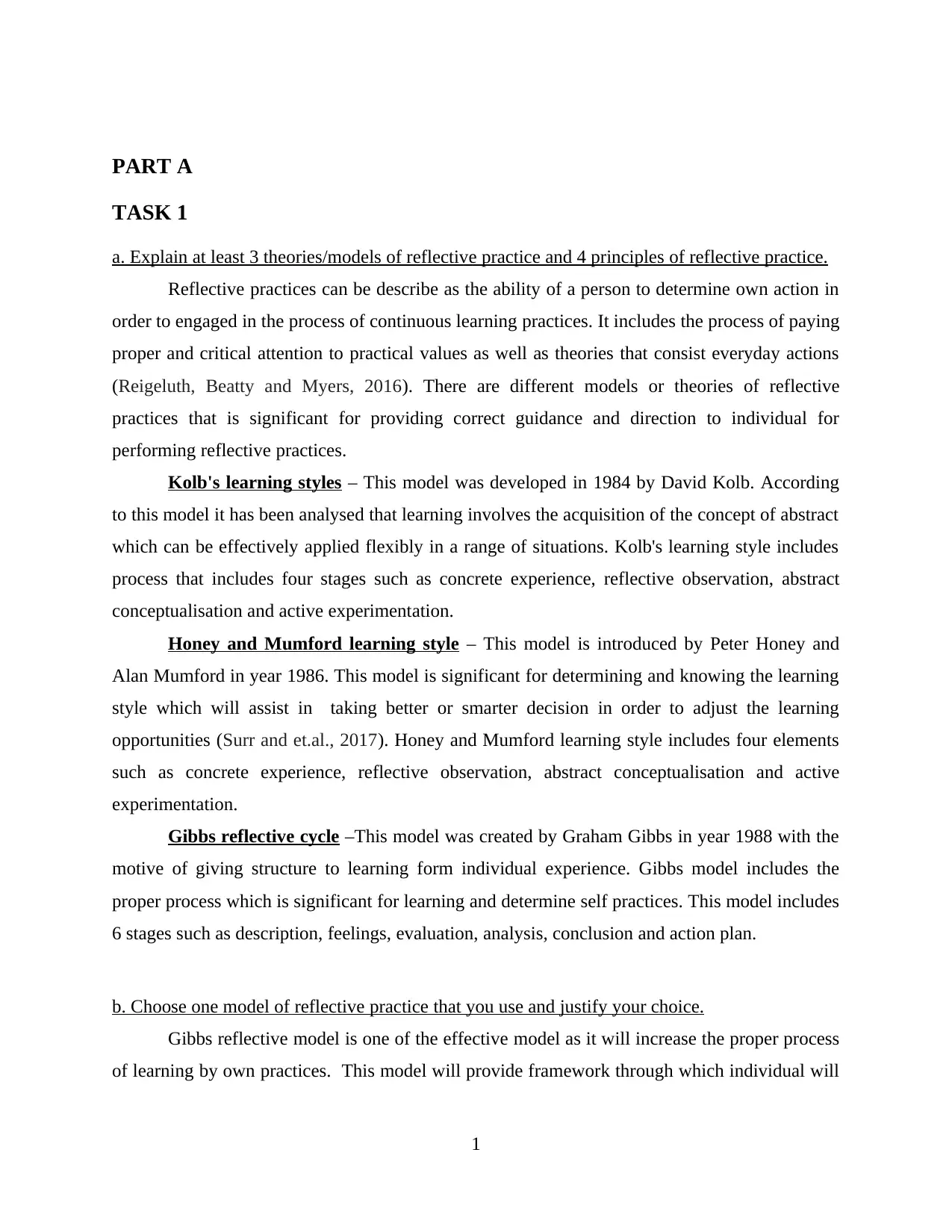
PART A
TASK 1
a. Explain at least 3 theories/models of reflective practice and 4 principles of reflective practice.
Reflective practices can be describe as the ability of a person to determine own action in
order to engaged in the process of continuous learning practices. It includes the process of paying
proper and critical attention to practical values as well as theories that consist everyday actions
(Reigeluth, Beatty and Myers, 2016). There are different models or theories of reflective
practices that is significant for providing correct guidance and direction to individual for
performing reflective practices.
Kolb's learning styles – This model was developed in 1984 by David Kolb. According
to this model it has been analysed that learning involves the acquisition of the concept of abstract
which can be effectively applied flexibly in a range of situations. Kolb's learning style includes
process that includes four stages such as concrete experience, reflective observation, abstract
conceptualisation and active experimentation.
Honey and Mumford learning style – This model is introduced by Peter Honey and
Alan Mumford in year 1986. This model is significant for determining and knowing the learning
style which will assist in taking better or smarter decision in order to adjust the learning
opportunities (Surr and et.al., 2017). Honey and Mumford learning style includes four elements
such as concrete experience, reflective observation, abstract conceptualisation and active
experimentation.
Gibbs reflective cycle –This model was created by Graham Gibbs in year 1988 with the
motive of giving structure to learning form individual experience. Gibbs model includes the
proper process which is significant for learning and determine self practices. This model includes
6 stages such as description, feelings, evaluation, analysis, conclusion and action plan.
b. Choose one model of reflective practice that you use and justify your choice.
Gibbs reflective model is one of the effective model as it will increase the proper process
of learning by own practices. This model will provide framework through which individual will
1
TASK 1
a. Explain at least 3 theories/models of reflective practice and 4 principles of reflective practice.
Reflective practices can be describe as the ability of a person to determine own action in
order to engaged in the process of continuous learning practices. It includes the process of paying
proper and critical attention to practical values as well as theories that consist everyday actions
(Reigeluth, Beatty and Myers, 2016). There are different models or theories of reflective
practices that is significant for providing correct guidance and direction to individual for
performing reflective practices.
Kolb's learning styles – This model was developed in 1984 by David Kolb. According
to this model it has been analysed that learning involves the acquisition of the concept of abstract
which can be effectively applied flexibly in a range of situations. Kolb's learning style includes
process that includes four stages such as concrete experience, reflective observation, abstract
conceptualisation and active experimentation.
Honey and Mumford learning style – This model is introduced by Peter Honey and
Alan Mumford in year 1986. This model is significant for determining and knowing the learning
style which will assist in taking better or smarter decision in order to adjust the learning
opportunities (Surr and et.al., 2017). Honey and Mumford learning style includes four elements
such as concrete experience, reflective observation, abstract conceptualisation and active
experimentation.
Gibbs reflective cycle –This model was created by Graham Gibbs in year 1988 with the
motive of giving structure to learning form individual experience. Gibbs model includes the
proper process which is significant for learning and determine self practices. This model includes
6 stages such as description, feelings, evaluation, analysis, conclusion and action plan.
b. Choose one model of reflective practice that you use and justify your choice.
Gibbs reflective model is one of the effective model as it will increase the proper process
of learning by own practices. This model will provide framework through which individual will
1
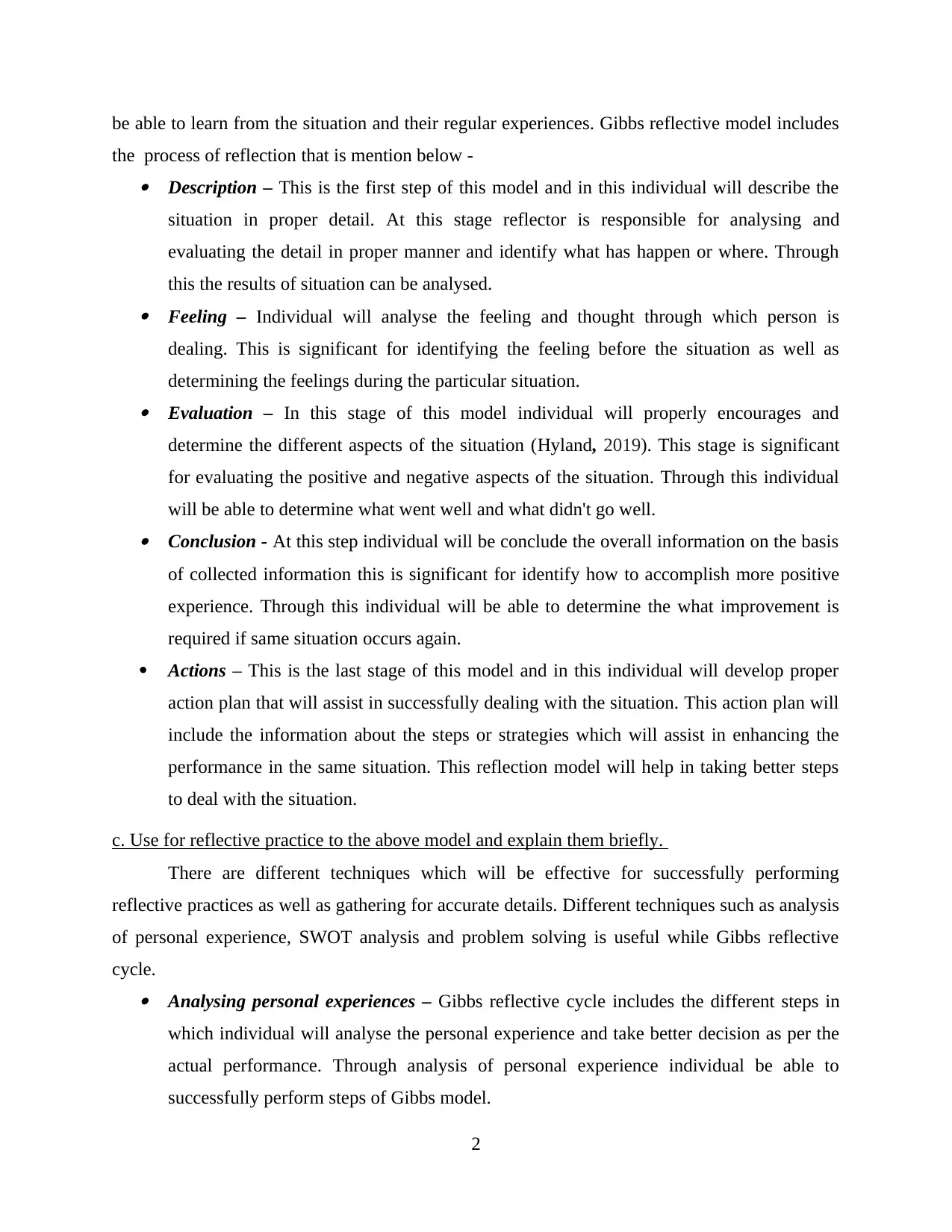
be able to learn from the situation and their regular experiences. Gibbs reflective model includes
the process of reflection that is mention below - Description – This is the first step of this model and in this individual will describe the
situation in proper detail. At this stage reflector is responsible for analysing and
evaluating the detail in proper manner and identify what has happen or where. Through
this the results of situation can be analysed. Feeling – Individual will analyse the feeling and thought through which person is
dealing. This is significant for identifying the feeling before the situation as well as
determining the feelings during the particular situation. Evaluation – In this stage of this model individual will properly encourages and
determine the different aspects of the situation (Hyland, 2019). This stage is significant
for evaluating the positive and negative aspects of the situation. Through this individual
will be able to determine what went well and what didn't go well. Conclusion - At this step individual will be conclude the overall information on the basis
of collected information this is significant for identify how to accomplish more positive
experience. Through this individual will be able to determine the what improvement is
required if same situation occurs again.
Actions – This is the last stage of this model and in this individual will develop proper
action plan that will assist in successfully dealing with the situation. This action plan will
include the information about the steps or strategies which will assist in enhancing the
performance in the same situation. This reflection model will help in taking better steps
to deal with the situation.
c. Use for reflective practice to the above model and explain them briefly.
There are different techniques which will be effective for successfully performing
reflective practices as well as gathering for accurate details. Different techniques such as analysis
of personal experience, SWOT analysis and problem solving is useful while Gibbs reflective
cycle. Analysing personal experiences – Gibbs reflective cycle includes the different steps in
which individual will analyse the personal experience and take better decision as per the
actual performance. Through analysis of personal experience individual be able to
successfully perform steps of Gibbs model.
2
the process of reflection that is mention below - Description – This is the first step of this model and in this individual will describe the
situation in proper detail. At this stage reflector is responsible for analysing and
evaluating the detail in proper manner and identify what has happen or where. Through
this the results of situation can be analysed. Feeling – Individual will analyse the feeling and thought through which person is
dealing. This is significant for identifying the feeling before the situation as well as
determining the feelings during the particular situation. Evaluation – In this stage of this model individual will properly encourages and
determine the different aspects of the situation (Hyland, 2019). This stage is significant
for evaluating the positive and negative aspects of the situation. Through this individual
will be able to determine what went well and what didn't go well. Conclusion - At this step individual will be conclude the overall information on the basis
of collected information this is significant for identify how to accomplish more positive
experience. Through this individual will be able to determine the what improvement is
required if same situation occurs again.
Actions – This is the last stage of this model and in this individual will develop proper
action plan that will assist in successfully dealing with the situation. This action plan will
include the information about the steps or strategies which will assist in enhancing the
performance in the same situation. This reflection model will help in taking better steps
to deal with the situation.
c. Use for reflective practice to the above model and explain them briefly.
There are different techniques which will be effective for successfully performing
reflective practices as well as gathering for accurate details. Different techniques such as analysis
of personal experience, SWOT analysis and problem solving is useful while Gibbs reflective
cycle. Analysing personal experiences – Gibbs reflective cycle includes the different steps in
which individual will analyse the personal experience and take better decision as per the
actual performance. Through analysis of personal experience individual be able to
successfully perform steps of Gibbs model.
2
Secure Best Marks with AI Grader
Need help grading? Try our AI Grader for instant feedback on your assignments.
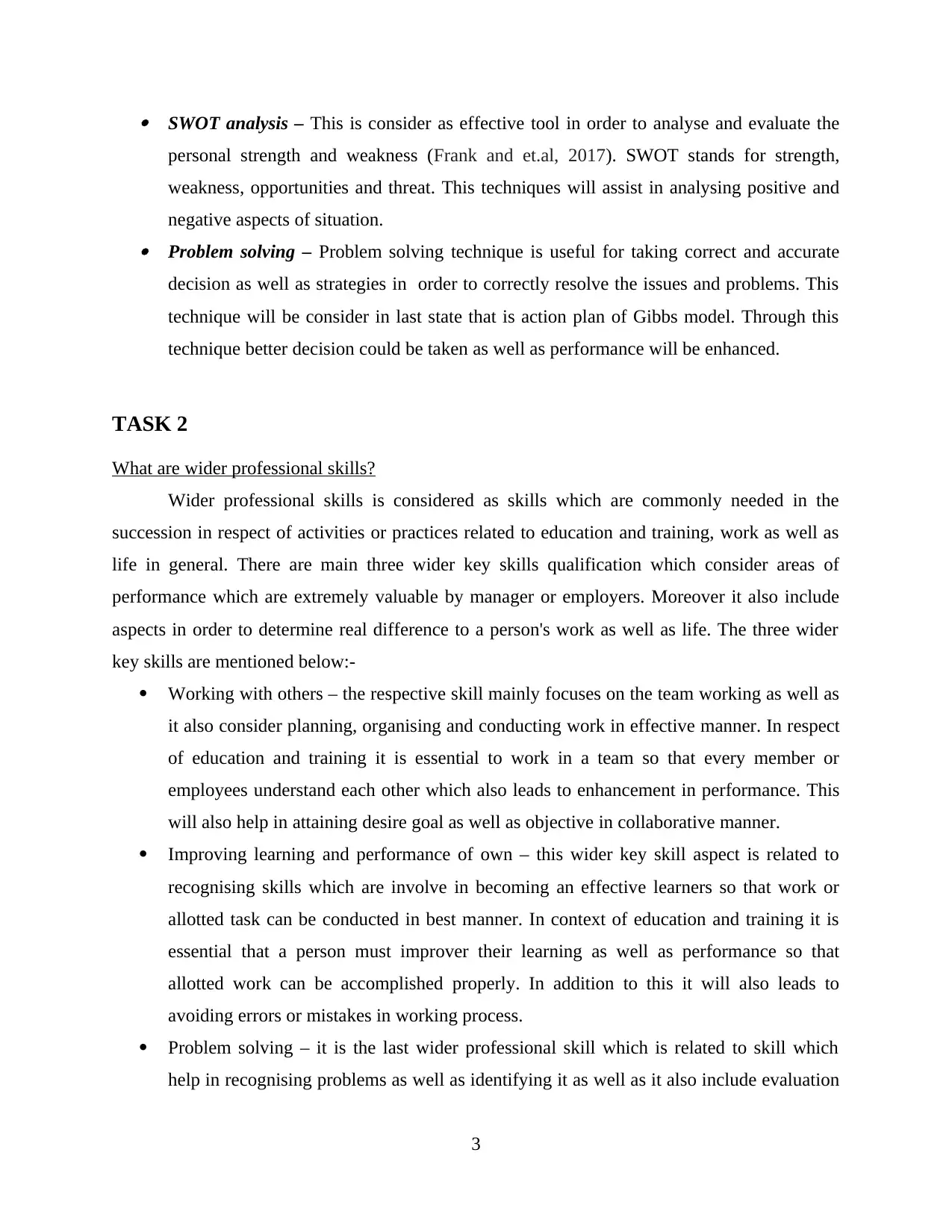
SWOT analysis – This is consider as effective tool in order to analyse and evaluate the
personal strength and weakness (Frank and et.al, 2017). SWOT stands for strength,
weakness, opportunities and threat. This techniques will assist in analysing positive and
negative aspects of situation. Problem solving – Problem solving technique is useful for taking correct and accurate
decision as well as strategies in order to correctly resolve the issues and problems. This
technique will be consider in last state that is action plan of Gibbs model. Through this
technique better decision could be taken as well as performance will be enhanced.
TASK 2
What are wider professional skills?
Wider professional skills is considered as skills which are commonly needed in the
succession in respect of activities or practices related to education and training, work as well as
life in general. There are main three wider key skills qualification which consider areas of
performance which are extremely valuable by manager or employers. Moreover it also include
aspects in order to determine real difference to a person's work as well as life. The three wider
key skills are mentioned below:-
Working with others – the respective skill mainly focuses on the team working as well as
it also consider planning, organising and conducting work in effective manner. In respect
of education and training it is essential to work in a team so that every member or
employees understand each other which also leads to enhancement in performance. This
will also help in attaining desire goal as well as objective in collaborative manner.
Improving learning and performance of own – this wider key skill aspect is related to
recognising skills which are involve in becoming an effective learners so that work or
allotted task can be conducted in best manner. In context of education and training it is
essential that a person must improver their learning as well as performance so that
allotted work can be accomplished properly. In addition to this it will also leads to
avoiding errors or mistakes in working process.
Problem solving – it is the last wider professional skill which is related to skill which
help in recognising problems as well as identifying it as well as it also include evaluation
3
personal strength and weakness (Frank and et.al, 2017). SWOT stands for strength,
weakness, opportunities and threat. This techniques will assist in analysing positive and
negative aspects of situation. Problem solving – Problem solving technique is useful for taking correct and accurate
decision as well as strategies in order to correctly resolve the issues and problems. This
technique will be consider in last state that is action plan of Gibbs model. Through this
technique better decision could be taken as well as performance will be enhanced.
TASK 2
What are wider professional skills?
Wider professional skills is considered as skills which are commonly needed in the
succession in respect of activities or practices related to education and training, work as well as
life in general. There are main three wider key skills qualification which consider areas of
performance which are extremely valuable by manager or employers. Moreover it also include
aspects in order to determine real difference to a person's work as well as life. The three wider
key skills are mentioned below:-
Working with others – the respective skill mainly focuses on the team working as well as
it also consider planning, organising and conducting work in effective manner. In respect
of education and training it is essential to work in a team so that every member or
employees understand each other which also leads to enhancement in performance. This
will also help in attaining desire goal as well as objective in collaborative manner.
Improving learning and performance of own – this wider key skill aspect is related to
recognising skills which are involve in becoming an effective learners so that work or
allotted task can be conducted in best manner. In context of education and training it is
essential that a person must improver their learning as well as performance so that
allotted work can be accomplished properly. In addition to this it will also leads to
avoiding errors or mistakes in working process.
Problem solving – it is the last wider professional skill which is related to skill which
help in recognising problems as well as identifying it as well as it also include evaluation
3
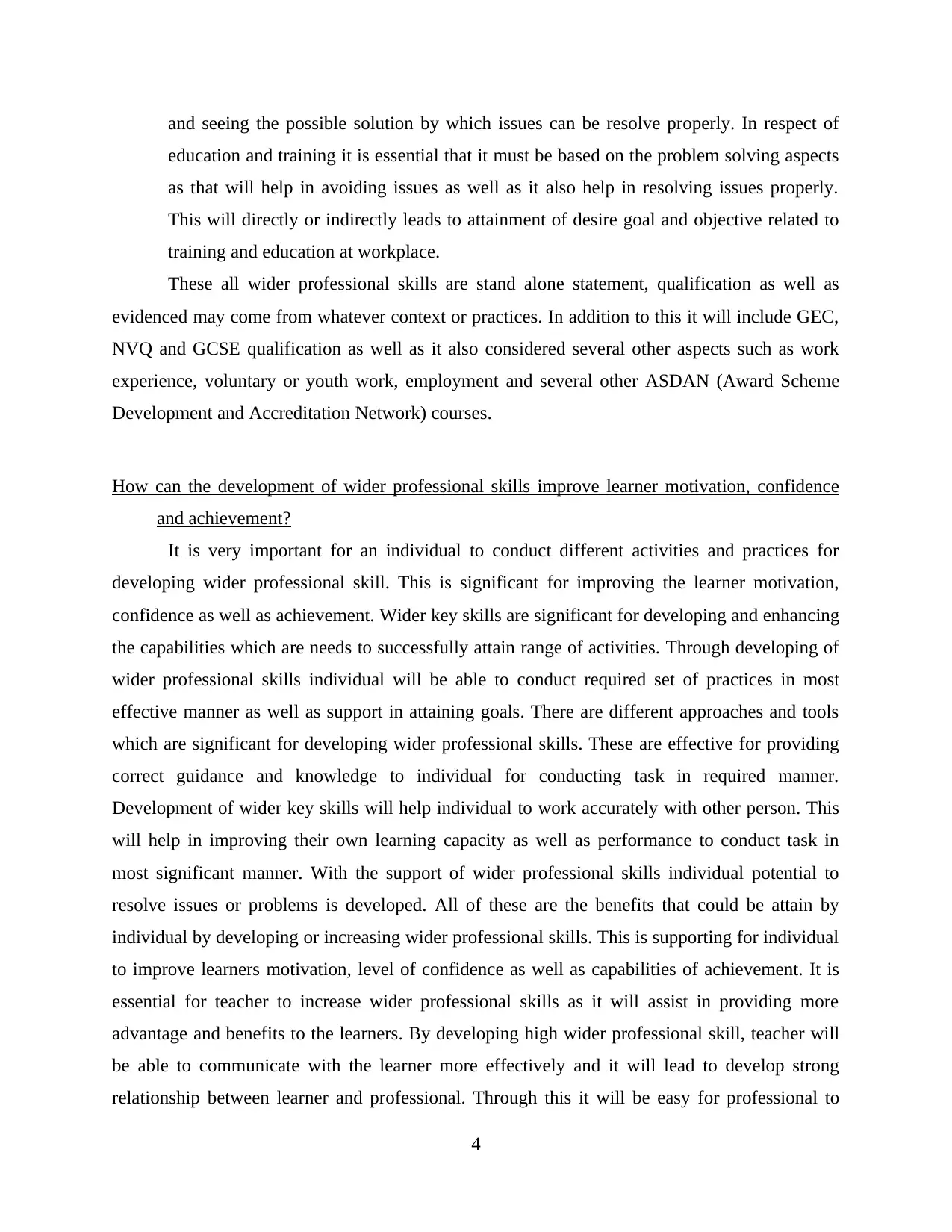
and seeing the possible solution by which issues can be resolve properly. In respect of
education and training it is essential that it must be based on the problem solving aspects
as that will help in avoiding issues as well as it also help in resolving issues properly.
This will directly or indirectly leads to attainment of desire goal and objective related to
training and education at workplace.
These all wider professional skills are stand alone statement, qualification as well as
evidenced may come from whatever context or practices. In addition to this it will include GEC,
NVQ and GCSE qualification as well as it also considered several other aspects such as work
experience, voluntary or youth work, employment and several other ASDAN (Award Scheme
Development and Accreditation Network) courses.
How can the development of wider professional skills improve learner motivation, confidence
and achievement?
It is very important for an individual to conduct different activities and practices for
developing wider professional skill. This is significant for improving the learner motivation,
confidence as well as achievement. Wider key skills are significant for developing and enhancing
the capabilities which are needs to successfully attain range of activities. Through developing of
wider professional skills individual will be able to conduct required set of practices in most
effective manner as well as support in attaining goals. There are different approaches and tools
which are significant for developing wider professional skills. These are effective for providing
correct guidance and knowledge to individual for conducting task in required manner.
Development of wider key skills will help individual to work accurately with other person. This
will help in improving their own learning capacity as well as performance to conduct task in
most significant manner. With the support of wider professional skills individual potential to
resolve issues or problems is developed. All of these are the benefits that could be attain by
individual by developing or increasing wider professional skills. This is supporting for individual
to improve learners motivation, level of confidence as well as capabilities of achievement. It is
essential for teacher to increase wider professional skills as it will assist in providing more
advantage and benefits to the learners. By developing high wider professional skill, teacher will
be able to communicate with the learner more effectively and it will lead to develop strong
relationship between learner and professional. Through this it will be easy for professional to
4
education and training it is essential that it must be based on the problem solving aspects
as that will help in avoiding issues as well as it also help in resolving issues properly.
This will directly or indirectly leads to attainment of desire goal and objective related to
training and education at workplace.
These all wider professional skills are stand alone statement, qualification as well as
evidenced may come from whatever context or practices. In addition to this it will include GEC,
NVQ and GCSE qualification as well as it also considered several other aspects such as work
experience, voluntary or youth work, employment and several other ASDAN (Award Scheme
Development and Accreditation Network) courses.
How can the development of wider professional skills improve learner motivation, confidence
and achievement?
It is very important for an individual to conduct different activities and practices for
developing wider professional skill. This is significant for improving the learner motivation,
confidence as well as achievement. Wider key skills are significant for developing and enhancing
the capabilities which are needs to successfully attain range of activities. Through developing of
wider professional skills individual will be able to conduct required set of practices in most
effective manner as well as support in attaining goals. There are different approaches and tools
which are significant for developing wider professional skills. These are effective for providing
correct guidance and knowledge to individual for conducting task in required manner.
Development of wider key skills will help individual to work accurately with other person. This
will help in improving their own learning capacity as well as performance to conduct task in
most significant manner. With the support of wider professional skills individual potential to
resolve issues or problems is developed. All of these are the benefits that could be attain by
individual by developing or increasing wider professional skills. This is supporting for individual
to improve learners motivation, level of confidence as well as capabilities of achievement. It is
essential for teacher to increase wider professional skills as it will assist in providing more
advantage and benefits to the learners. By developing high wider professional skill, teacher will
be able to communicate with the learner more effectively and it will lead to develop strong
relationship between learner and professional. Through this it will be easy for professional to
4
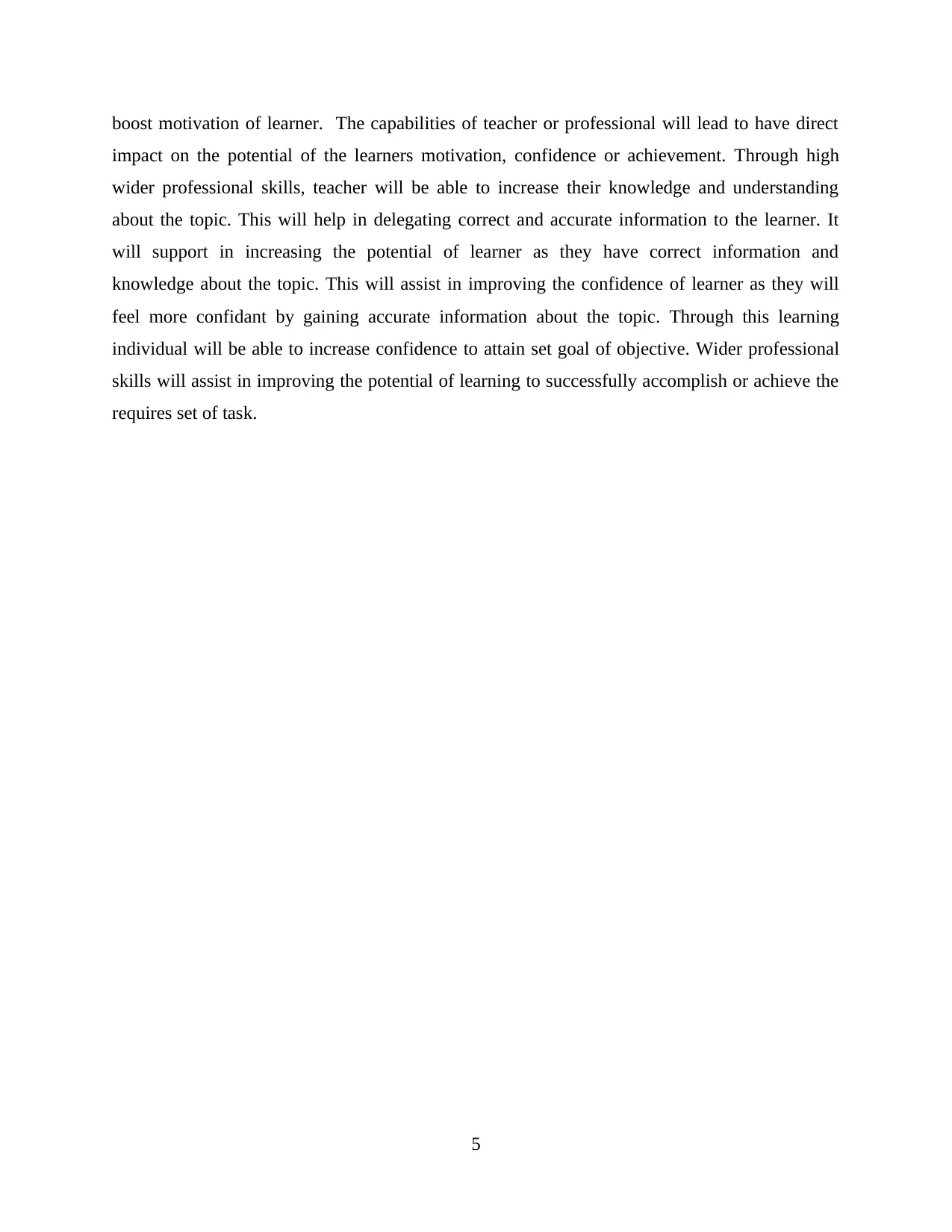
boost motivation of learner. The capabilities of teacher or professional will lead to have direct
impact on the potential of the learners motivation, confidence or achievement. Through high
wider professional skills, teacher will be able to increase their knowledge and understanding
about the topic. This will help in delegating correct and accurate information to the learner. It
will support in increasing the potential of learner as they have correct information and
knowledge about the topic. This will assist in improving the confidence of learner as they will
feel more confidant by gaining accurate information about the topic. Through this learning
individual will be able to increase confidence to attain set goal of objective. Wider professional
skills will assist in improving the potential of learning to successfully accomplish or achieve the
requires set of task.
5
impact on the potential of the learners motivation, confidence or achievement. Through high
wider professional skills, teacher will be able to increase their knowledge and understanding
about the topic. This will help in delegating correct and accurate information to the learner. It
will support in increasing the potential of learner as they have correct information and
knowledge about the topic. This will assist in improving the confidence of learner as they will
feel more confidant by gaining accurate information about the topic. Through this learning
individual will be able to increase confidence to attain set goal of objective. Wider professional
skills will assist in improving the potential of learning to successfully accomplish or achieve the
requires set of task.
5
Paraphrase This Document
Need a fresh take? Get an instant paraphrase of this document with our AI Paraphraser
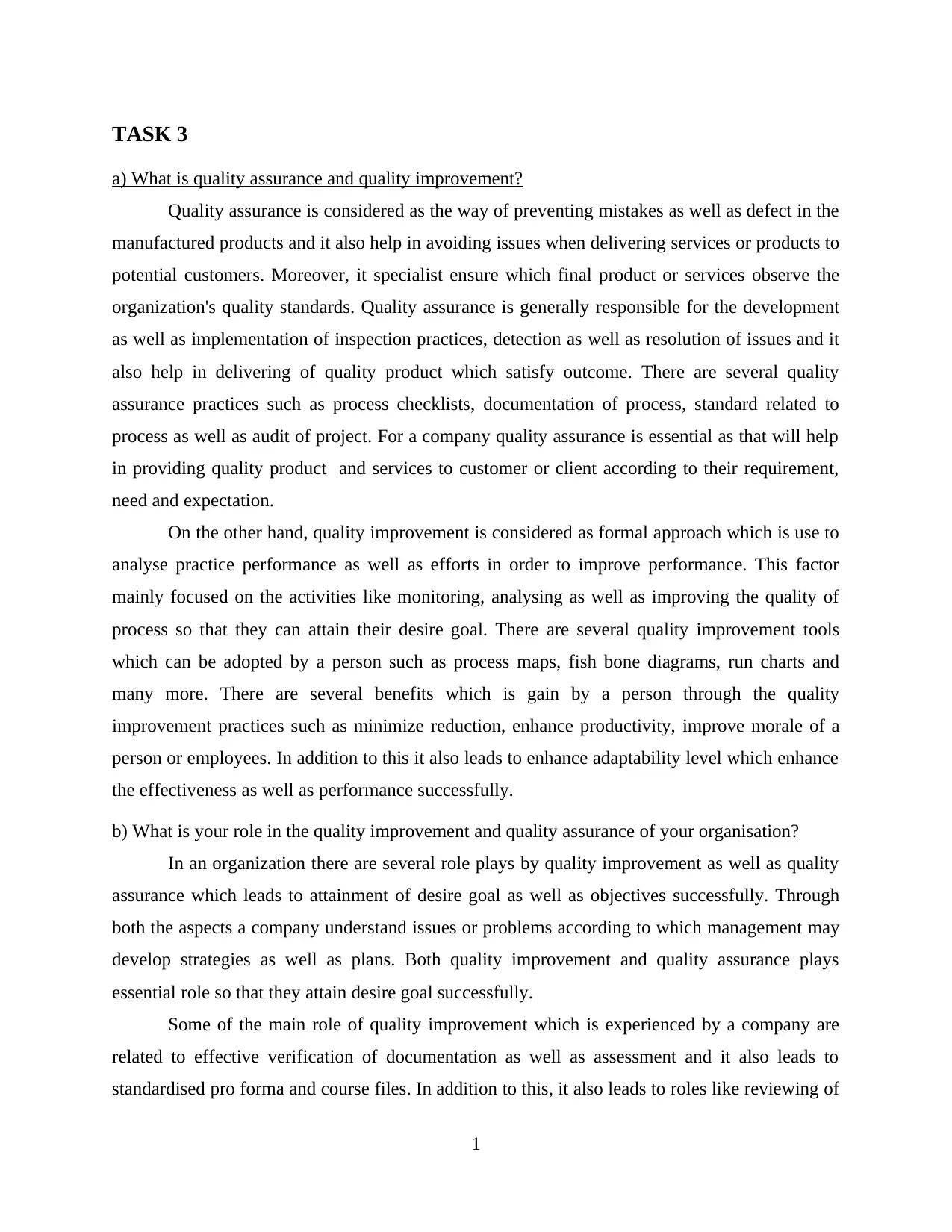
TASK 3
a) What is quality assurance and quality improvement?
Quality assurance is considered as the way of preventing mistakes as well as defect in the
manufactured products and it also help in avoiding issues when delivering services or products to
potential customers. Moreover, it specialist ensure which final product or services observe the
organization's quality standards. Quality assurance is generally responsible for the development
as well as implementation of inspection practices, detection as well as resolution of issues and it
also help in delivering of quality product which satisfy outcome. There are several quality
assurance practices such as process checklists, documentation of process, standard related to
process as well as audit of project. For a company quality assurance is essential as that will help
in providing quality product and services to customer or client according to their requirement,
need and expectation.
On the other hand, quality improvement is considered as formal approach which is use to
analyse practice performance as well as efforts in order to improve performance. This factor
mainly focused on the activities like monitoring, analysing as well as improving the quality of
process so that they can attain their desire goal. There are several quality improvement tools
which can be adopted by a person such as process maps, fish bone diagrams, run charts and
many more. There are several benefits which is gain by a person through the quality
improvement practices such as minimize reduction, enhance productivity, improve morale of a
person or employees. In addition to this it also leads to enhance adaptability level which enhance
the effectiveness as well as performance successfully.
b) What is your role in the quality improvement and quality assurance of your organisation?
In an organization there are several role plays by quality improvement as well as quality
assurance which leads to attainment of desire goal as well as objectives successfully. Through
both the aspects a company understand issues or problems according to which management may
develop strategies as well as plans. Both quality improvement and quality assurance plays
essential role so that they attain desire goal successfully.
Some of the main role of quality improvement which is experienced by a company are
related to effective verification of documentation as well as assessment and it also leads to
standardised pro forma and course files. In addition to this, it also leads to roles like reviewing of
1
a) What is quality assurance and quality improvement?
Quality assurance is considered as the way of preventing mistakes as well as defect in the
manufactured products and it also help in avoiding issues when delivering services or products to
potential customers. Moreover, it specialist ensure which final product or services observe the
organization's quality standards. Quality assurance is generally responsible for the development
as well as implementation of inspection practices, detection as well as resolution of issues and it
also help in delivering of quality product which satisfy outcome. There are several quality
assurance practices such as process checklists, documentation of process, standard related to
process as well as audit of project. For a company quality assurance is essential as that will help
in providing quality product and services to customer or client according to their requirement,
need and expectation.
On the other hand, quality improvement is considered as formal approach which is use to
analyse practice performance as well as efforts in order to improve performance. This factor
mainly focused on the activities like monitoring, analysing as well as improving the quality of
process so that they can attain their desire goal. There are several quality improvement tools
which can be adopted by a person such as process maps, fish bone diagrams, run charts and
many more. There are several benefits which is gain by a person through the quality
improvement practices such as minimize reduction, enhance productivity, improve morale of a
person or employees. In addition to this it also leads to enhance adaptability level which enhance
the effectiveness as well as performance successfully.
b) What is your role in the quality improvement and quality assurance of your organisation?
In an organization there are several role plays by quality improvement as well as quality
assurance which leads to attainment of desire goal as well as objectives successfully. Through
both the aspects a company understand issues or problems according to which management may
develop strategies as well as plans. Both quality improvement and quality assurance plays
essential role so that they attain desire goal successfully.
Some of the main role of quality improvement which is experienced by a company are
related to effective verification of documentation as well as assessment and it also leads to
standardised pro forma and course files. In addition to this, it also leads to roles like reviewing of
1
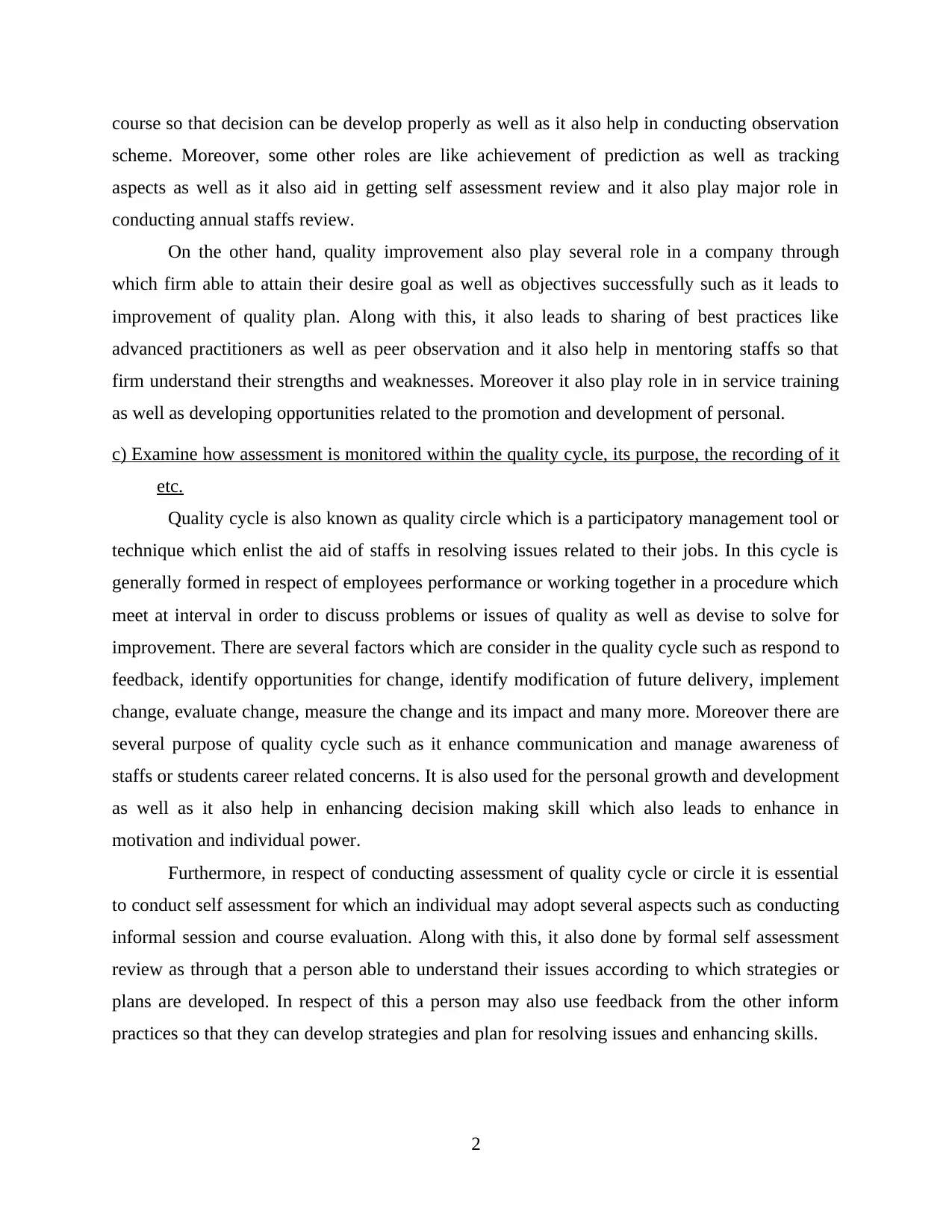
course so that decision can be develop properly as well as it also help in conducting observation
scheme. Moreover, some other roles are like achievement of prediction as well as tracking
aspects as well as it also aid in getting self assessment review and it also play major role in
conducting annual staffs review.
On the other hand, quality improvement also play several role in a company through
which firm able to attain their desire goal as well as objectives successfully such as it leads to
improvement of quality plan. Along with this, it also leads to sharing of best practices like
advanced practitioners as well as peer observation and it also help in mentoring staffs so that
firm understand their strengths and weaknesses. Moreover it also play role in in service training
as well as developing opportunities related to the promotion and development of personal.
c) Examine how assessment is monitored within the quality cycle, its purpose, the recording of it
etc.
Quality cycle is also known as quality circle which is a participatory management tool or
technique which enlist the aid of staffs in resolving issues related to their jobs. In this cycle is
generally formed in respect of employees performance or working together in a procedure which
meet at interval in order to discuss problems or issues of quality as well as devise to solve for
improvement. There are several factors which are consider in the quality cycle such as respond to
feedback, identify opportunities for change, identify modification of future delivery, implement
change, evaluate change, measure the change and its impact and many more. Moreover there are
several purpose of quality cycle such as it enhance communication and manage awareness of
staffs or students career related concerns. It is also used for the personal growth and development
as well as it also help in enhancing decision making skill which also leads to enhance in
motivation and individual power.
Furthermore, in respect of conducting assessment of quality cycle or circle it is essential
to conduct self assessment for which an individual may adopt several aspects such as conducting
informal session and course evaluation. Along with this, it also done by formal self assessment
review as through that a person able to understand their issues according to which strategies or
plans are developed. In respect of this a person may also use feedback from the other inform
practices so that they can develop strategies and plan for resolving issues and enhancing skills.
2
scheme. Moreover, some other roles are like achievement of prediction as well as tracking
aspects as well as it also aid in getting self assessment review and it also play major role in
conducting annual staffs review.
On the other hand, quality improvement also play several role in a company through
which firm able to attain their desire goal as well as objectives successfully such as it leads to
improvement of quality plan. Along with this, it also leads to sharing of best practices like
advanced practitioners as well as peer observation and it also help in mentoring staffs so that
firm understand their strengths and weaknesses. Moreover it also play role in in service training
as well as developing opportunities related to the promotion and development of personal.
c) Examine how assessment is monitored within the quality cycle, its purpose, the recording of it
etc.
Quality cycle is also known as quality circle which is a participatory management tool or
technique which enlist the aid of staffs in resolving issues related to their jobs. In this cycle is
generally formed in respect of employees performance or working together in a procedure which
meet at interval in order to discuss problems or issues of quality as well as devise to solve for
improvement. There are several factors which are consider in the quality cycle such as respond to
feedback, identify opportunities for change, identify modification of future delivery, implement
change, evaluate change, measure the change and its impact and many more. Moreover there are
several purpose of quality cycle such as it enhance communication and manage awareness of
staffs or students career related concerns. It is also used for the personal growth and development
as well as it also help in enhancing decision making skill which also leads to enhance in
motivation and individual power.
Furthermore, in respect of conducting assessment of quality cycle or circle it is essential
to conduct self assessment for which an individual may adopt several aspects such as conducting
informal session and course evaluation. Along with this, it also done by formal self assessment
review as through that a person able to understand their issues according to which strategies or
plans are developed. In respect of this a person may also use feedback from the other inform
practices so that they can develop strategies and plan for resolving issues and enhancing skills.
2
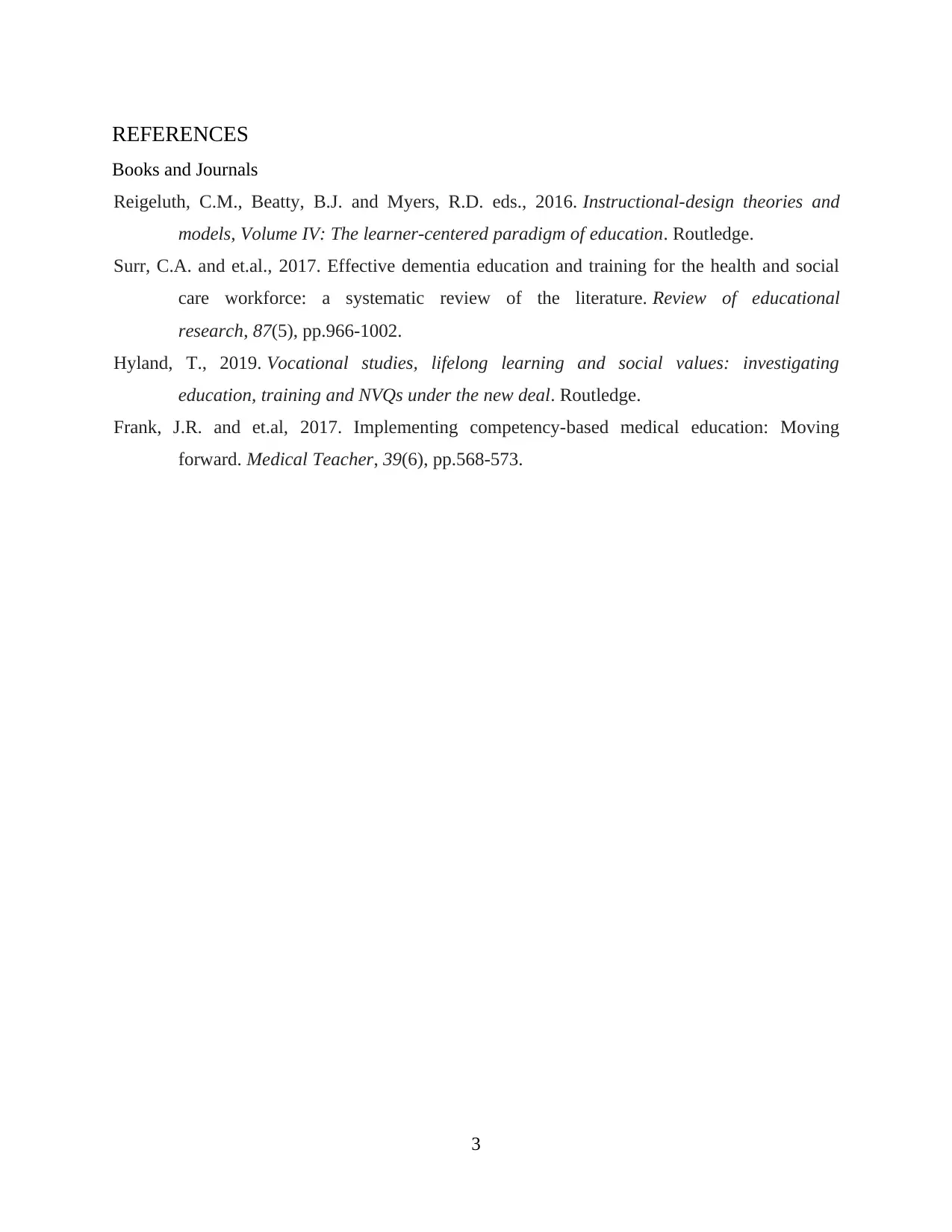
REFERENCES
Books and Journals
Reigeluth, C.M., Beatty, B.J. and Myers, R.D. eds., 2016. Instructional-design theories and
models, Volume IV: The learner-centered paradigm of education. Routledge.
Surr, C.A. and et.al., 2017. Effective dementia education and training for the health and social
care workforce: a systematic review of the literature. Review of educational
research, 87(5), pp.966-1002.
Hyland, T., 2019. Vocational studies, lifelong learning and social values: investigating
education, training and NVQs under the new deal. Routledge.
Frank, J.R. and et.al, 2017. Implementing competency-based medical education: Moving
forward. Medical Teacher, 39(6), pp.568-573.
3
Books and Journals
Reigeluth, C.M., Beatty, B.J. and Myers, R.D. eds., 2016. Instructional-design theories and
models, Volume IV: The learner-centered paradigm of education. Routledge.
Surr, C.A. and et.al., 2017. Effective dementia education and training for the health and social
care workforce: a systematic review of the literature. Review of educational
research, 87(5), pp.966-1002.
Hyland, T., 2019. Vocational studies, lifelong learning and social values: investigating
education, training and NVQs under the new deal. Routledge.
Frank, J.R. and et.al, 2017. Implementing competency-based medical education: Moving
forward. Medical Teacher, 39(6), pp.568-573.
3
1 out of 10
Related Documents
Your All-in-One AI-Powered Toolkit for Academic Success.
+13062052269
info@desklib.com
Available 24*7 on WhatsApp / Email
![[object Object]](/_next/static/media/star-bottom.7253800d.svg)
Unlock your academic potential
© 2024 | Zucol Services PVT LTD | All rights reserved.




